He used the phrase "the empire of democracy", and by that he meant the ways in which the general conditions of equality that he saw in America were something fundamental to what American democracy was. He was writing this for a French audience, and he was in many ways trying to educate and to convince his French audience that there was something in the American model of democracy that France might wish to aspire to. There is a certain play on words here as well, because Tocqueville, like many liberals, was also an imperialist. The phrase "empire of democracy" has, in a sense, a double meaning.
The empire of democracy
Historical and Political Geographer
- Democracy is not a fixed inheritance but a continually reinvented system shaped by each era’s social and institutional needs.
- The economic and political upheavals of the late 1960s and 1970s, including the collapse of Bretton Woods, set the conditions for today’s globalized democratic order.
- Modern democracy must constantly balance freedom with equality, a tension that becomes acute when growth falters or institutions erode.
- Democracy’s survival depends on active stewardship; assuming it will always muddle through risks its gradual decay.
"Empire of Democracy"
The title "Empire of Democracy" comes from a quote of the French liberal Alexis de Tocqueville, writing back in the 1830s about what he had seen in America.
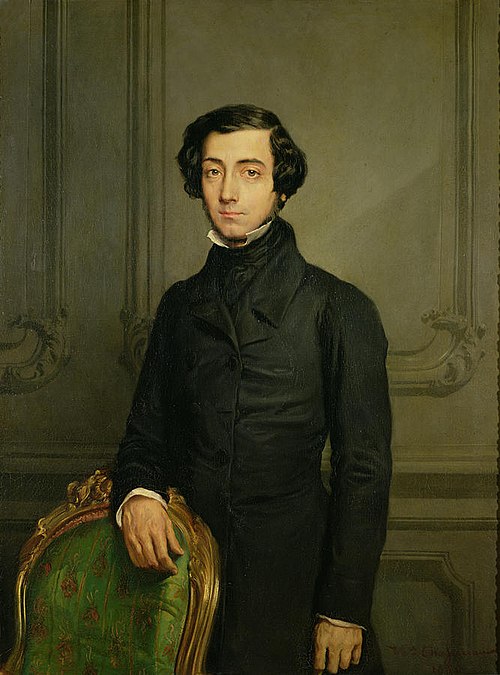
Alexis de Tocqueville by Théodore Chassériau © Museum of the History of France (Versailles)
The ideal of democracy
While democracies and the ideal of democracy are no guarantee that societies cannot do things that are wrong, that you cannot have both liberal democracies as well as illiberal democracies or even undemocratic liberal societies — and one could think of perhaps Hungary as an example of an illiberal democracy, and you could think of the US today even perhaps as an example of an undemocratic liberal society — the point is that this notion of democracy is not a given; it is not something inherited from the ancient world.
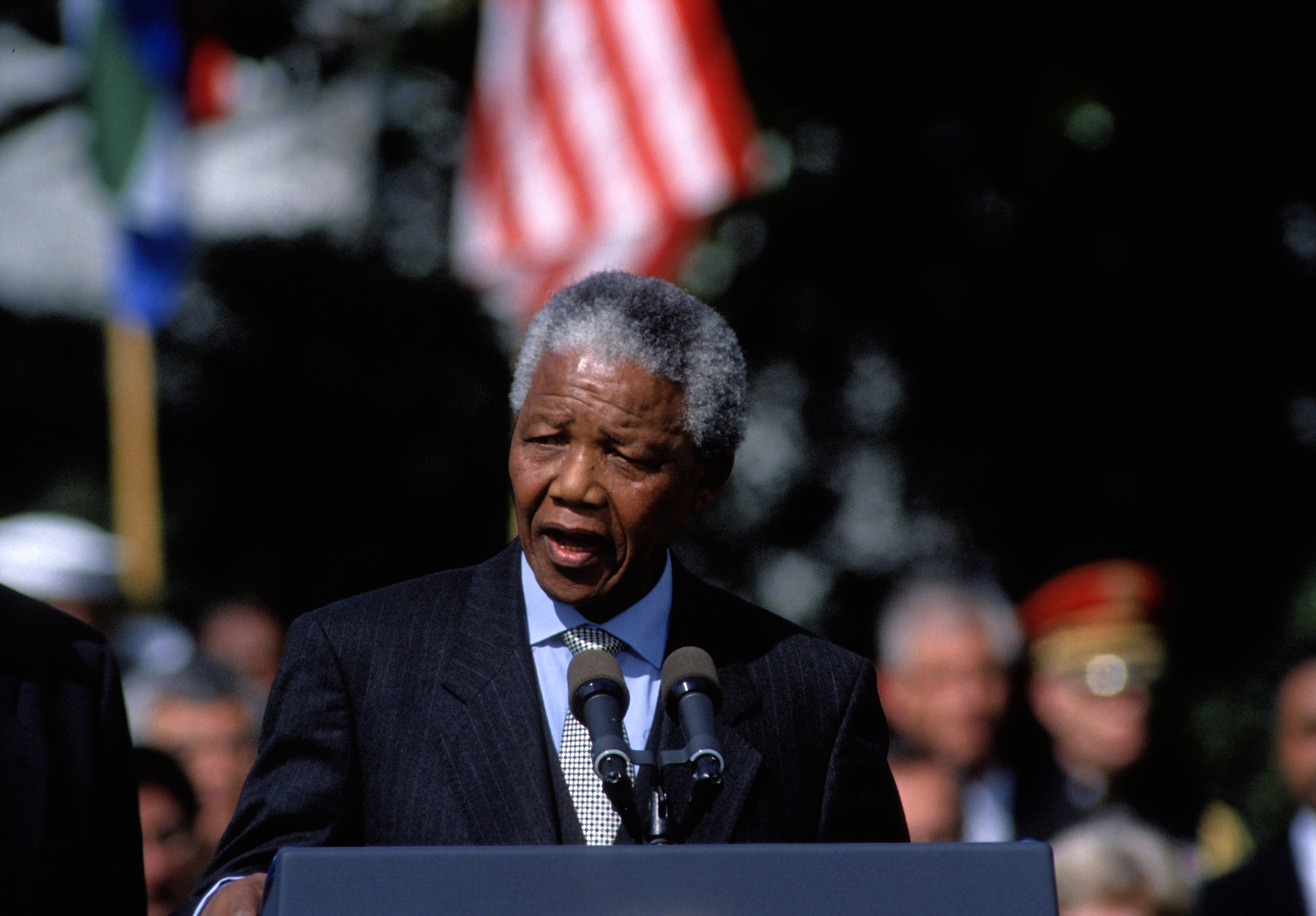 Nelson Mandela © Shutterstock
Nelson Mandela © Shutterstock
It is something that has been constantly reinvented through history in different periods and in relation to different needs of societies at the time, and this was what Tocqueville was really getting to the heart of. What is it that drives those changes? How do we understand our era of democracy (which I argue began really as recently as the 1970s from previous eras), and what is it that is fundamentally at the core of the democracy we live in today? These are important questions to ask, and as we see, I would argue, democracy is changing again before our eyes all around us.
The core of democracy
One of the other things that Tocqueville mentions in that quote on the empire of democracy is what he refers to as the ideas and institutions of society. For me, that is at the core of what democracy is. The ideas that democracy — modern democracy, our democracy — codes for are, on the one hand, liberalism and freedom, and on the other hand, equality. These are not always two values that go very well together. My freedom is not necessarily the same as your freedom, and my capacity to enjoy my freedom may often come at the expense of your freedom. Freedom and equality can in some ways work against each other, and managing that tension has been at the heart of the democratic enterprise for all of the last 200 years. The ways in which it was solved as a problem in the post-war era, post-1945, which was, just to give a few examples, one very much based on a model of political citizenship and duty and conformity, was also based on a model of economic growth and a welfare state that enabled people to live up to their own aspirations without worrying about treading on the aspirations of others. They could do it without worrying about the influx of others from other parts of the world, without worrying about a growth in inequality — quite the opposite. Economic growth led to greater equality for much of that period — in other words, the ideal conditions for this problem of equality and freedom to be solved.
 © German Federal Archives
© German Federal Archives
After the 1970s, when many of those assumptions, and also many of the institutions that enabled those assumptions to take place, began to fall apart all at the same time, suddenly the answer to that question changed. My argument is that it is this change that gives us the form of democracy we have today, and so it makes sense to not take democracy for granted, to not assume that democracy will always muddle through. It depends entirely on the quality of the answers we give; it depends on the quality of the leadership; and it depends on the capacity of individuals, through the institutions that they are given, to live up to the challenge of reconciling in productive ways, in positive ways, freedom with equality.
Post-1970s transformations
One of the things that is really ingrained in how we think about and write history is the idea that historical periods begin and end in a particular year — the great year theory of history, if you like — 1945, 1989, 1968 for those who study social history, with the student uprisings of that year.
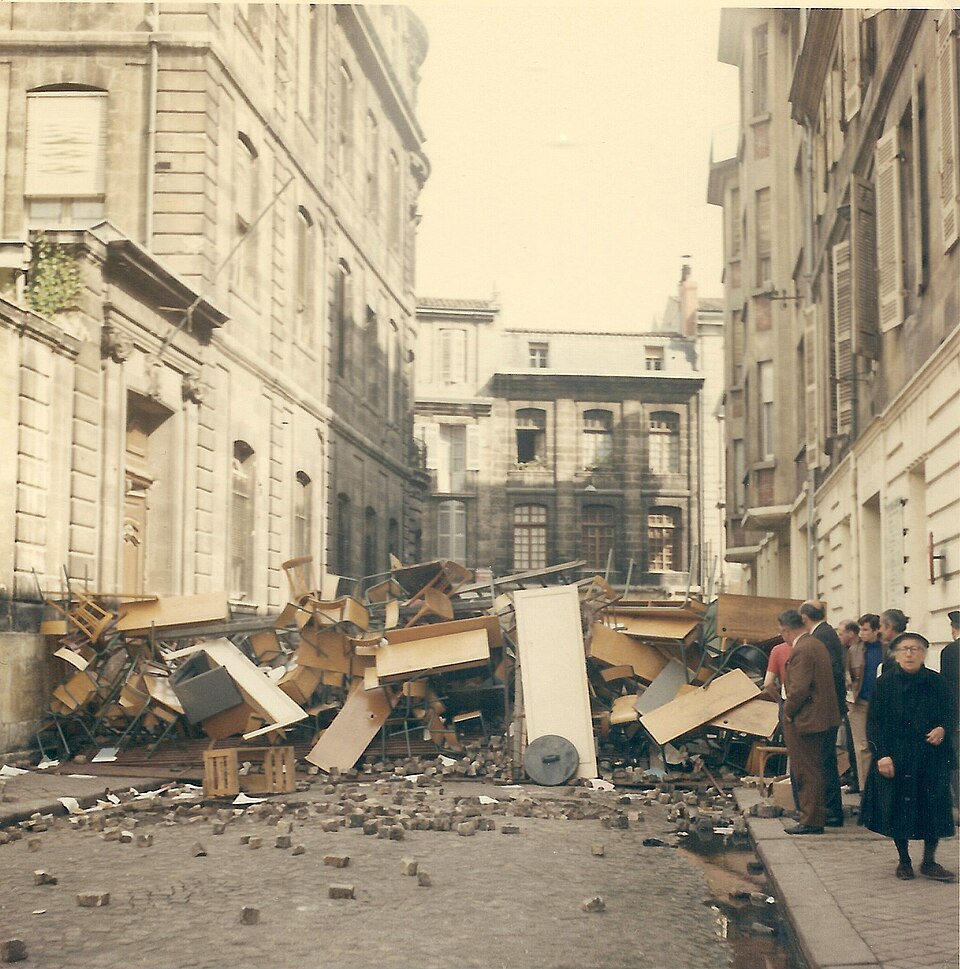 Protests of May 1968 in Paris © Tangopaso via Wikimedia
Protests of May 1968 in Paris © Tangopaso via Wikimedia
In truth, histories are formed and periods are established in many different ways, and it often depends on what your lens is. If we are focused on politics and the military, then the beginnings and ends of wars make sense. If we are focused on the economy, however, we might come up with very different periodizations. This was one reason why, in beginning to write a history of the post-1989 era, the post-Cold War era, it became very apparent to me very early on that that actually is a story, a period that begins much earlier. It begins in this transitional moment in the late 1960s and the early 1970s, when the assumptions of a post-war generation are falling apart; when the economic conditions are changing; when we have not only political and military upheavals around the world, the rise of radicalism, right-wing and left-wing alike; when we have the oil shocks of 1973 transforming the relationship between different economic models — the ways in which Europe, for example, and the US managed their international affairs; and we have a whole series of other challenges that really brought into question whether the post-war institutions of liberal democratic societies that had been rebuilt after the war were any longer fit to the challenges of the moment. In other words, a series of questions were posed. It is really in the answers that were given to those questions that the subsequent era of democracy was established.
Bretton Woods collapse and globalization
One of the tectonic shifts of the early 1970s was the breakup of the Bretton Woods system. The Bretton Woods system had been the way in which the Allied powers after the Second World War, 1945, had established their international relations and had established the basis for an international world economy.
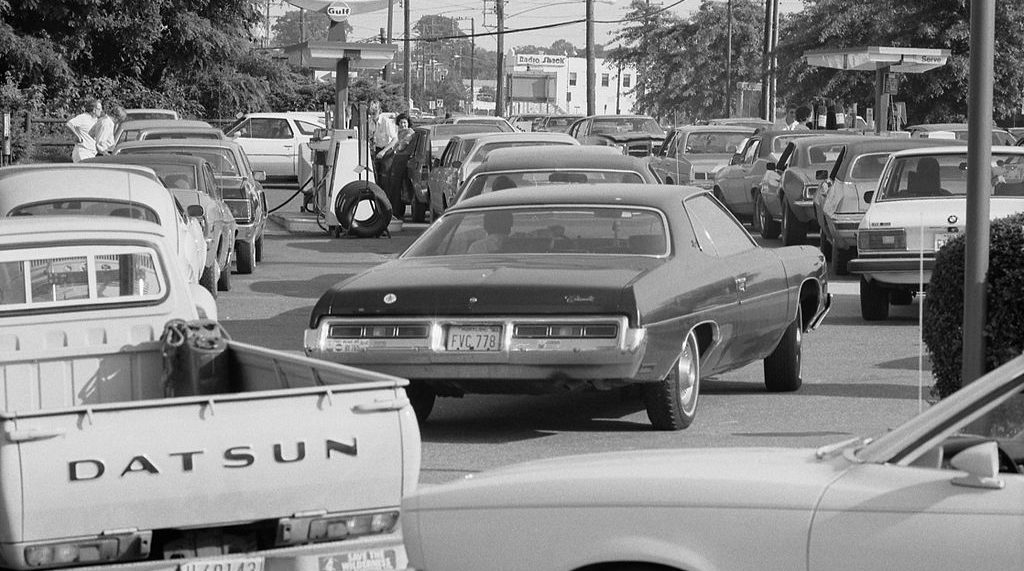 Line at a gas station © Warren K. Leffler via Wikimedia
Line at a gas station © Warren K. Leffler via Wikimedia
The transformation of that system in the early 1970s, beginning when Nixon unpegged the dollar from gold, gave rise to not simply a new economic reality — from one in which the relations between domestic economies were tied and fixed, always moving in a certain degree of rigidity to one in which economies were much more fluid and free — in a sense, the beginning of globalization as we experience it today. It also gave rise to a whole series of social responses and institutional responses to that changing underlying political economy. While none of these are things that crop up on the radar of the events of the time immediately — there were no, specifically speaking, wars related to those changes — nonetheless, the conditions that they set in train become a part of the way in which North America and Western Europe in particular continue to evolve in the rest of the 1970s and into the 1980s.
Reassessing 1989
1989 is one of those years in the Western historical canon that has a strong political morality attached to it. By that I mean there is a narrative about what 1989 meant that supersedes the reality of what 1989 was. 1989 is usually interpreted as the great gift of democracy from the West to the East. Eastern European countries that had been living under authoritarian rule suddenly were free, able to become democracies, to engage and to merge with the Western economic world order, and their citizens were granted rights and freedoms that they had for many years only wished they could have had.
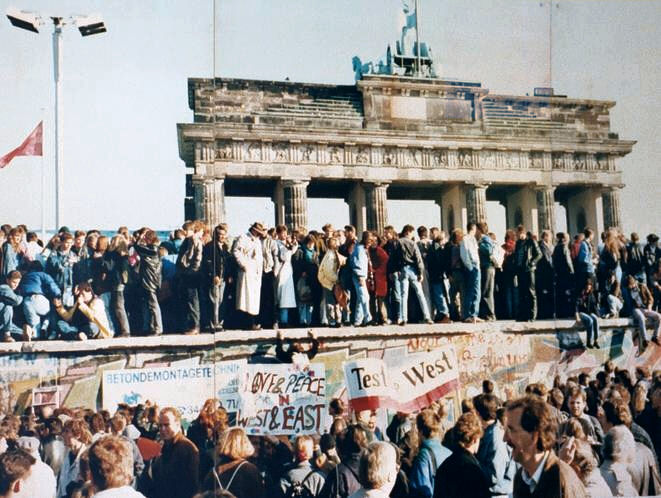 West and East Germans at the Brandenburg Gate in 1989 © Senate of Berlin via Wikimedia
West and East Germans at the Brandenburg Gate in 1989 © Senate of Berlin via Wikimedia
There is a huge amount of truth to this, and there is a huge amount of benefit for all of those citizens attached to those changes; however, the narrative that somehow democracy is or was or can be something that is given to a country — this whole notion of democracy promotion — is fundamentally flawed. It is flawed because democracy emerges in and through what societies themselves determine, and it is flawed because what was actually given to the East in the years after 1989 was much less obviously democracy than it was free markets and capitalism, particularly in a country like Russia. What was given was, in a sense, something that was taken. Markets were opened up, companies and investments moved in, and the capacity of those societies to respond to those changes, almost overnight, perhaps not surprisingly, overwhelmed many of them in the interim period.
Financial crisis and activism
One of the other things that the narrative of 1989 obscures is the question that, in a way, Western liberal democratic societies had begun to pose to themselves already in the 1980s, which is whether freedom and free markets necessarily create better, more coherent, cohesive and happier societies. By banishing that question, at least for a decade or so (the 1990s in particular were a period when it seemed that all of the problems of the past had been resolved, the world was opening up, societies were coming together and in many ways Tocqueville's vision had been realized), what we saw, come the financial crisis, was the beginning of the realization that the market growth upon which those particular benefits and privileges of Western society had been based came crashing down.
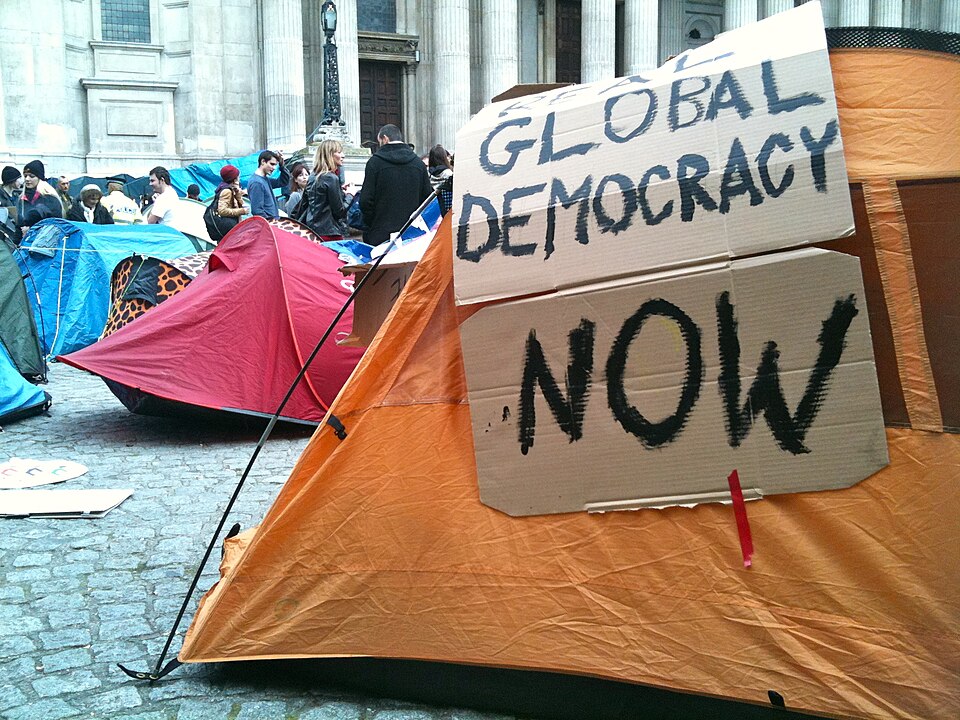 Occupy London © Neil Cummings via Wikimedia
Occupy London © Neil Cummings via Wikimedia
It perhaps should have been less of a surprise to us that there was an upwelling of response around the world, in terms of civil society movements, sit-ins, protests, all of which were in many ways a reaction to the fact that the causes of the political challenges and the economic challenges of the time were much more deeply rooted than perhaps we had expected.
Imagining equity
There are many writers, scholars and thinkers who over the years, centuries, have tried to envisage and imagine what a fair and equitable world looks like. They come from different disciplines and different backgrounds. Some of the most influential visions, certainly, that have shaped the late 20th century and the early 21st century come from the writings and the thinkings of economists: people who were classically, often mid- to late 20th-century intellectuals, people who saw the world in some ways as an extension of how they saw their own societies.
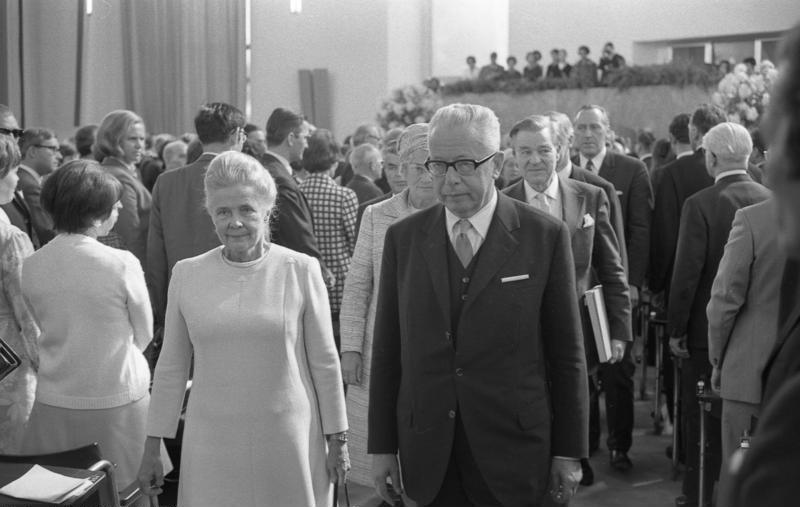 Alva and Gunnar Myrdal © German Federal Archives
Alva and Gunnar Myrdal © German Federal Archives
Gunnar Myrdal, for example, a Swedish economist writing very much from the perspective really of two places (of Sweden, first of all, where he lived and worked, and of the US, where he had spent a lot of time) imagined, envisaged and dared to believe, perhaps, that those ideas, those policies, the welfare state, could be replicated around the world. Of course, the reality is that welfare states require certain conditions to be established. They require certain benefits in terms of economic growth, resources, the capacity to exploit and make use of those resources. The very global economy that someone like Gunnar Myrdal was instrumental in building, establishing and regulating through his work as a UN civil servant is, of course, actually one of the fundamental reasons why many countries were unable to develop welfare states in the way that North European or Western European countries had been able to.
Limits of democratic transfer
One of the paradoxes of the history of international economic thought over the last few decades has been that the very ideas that we believe are transferable turn out to be ideas that need to be rethought and rebuilt, also from the perspective of those other countries. Even in Gunnar Myrdal's time, this was something that other writers like Raúl Prebisch, for example, were very strong pushing back on, insisting that development required their own countries to have the capacity to develop rather than to be underdeveloped by other countries. This really remains the legacy of international economic thought today.
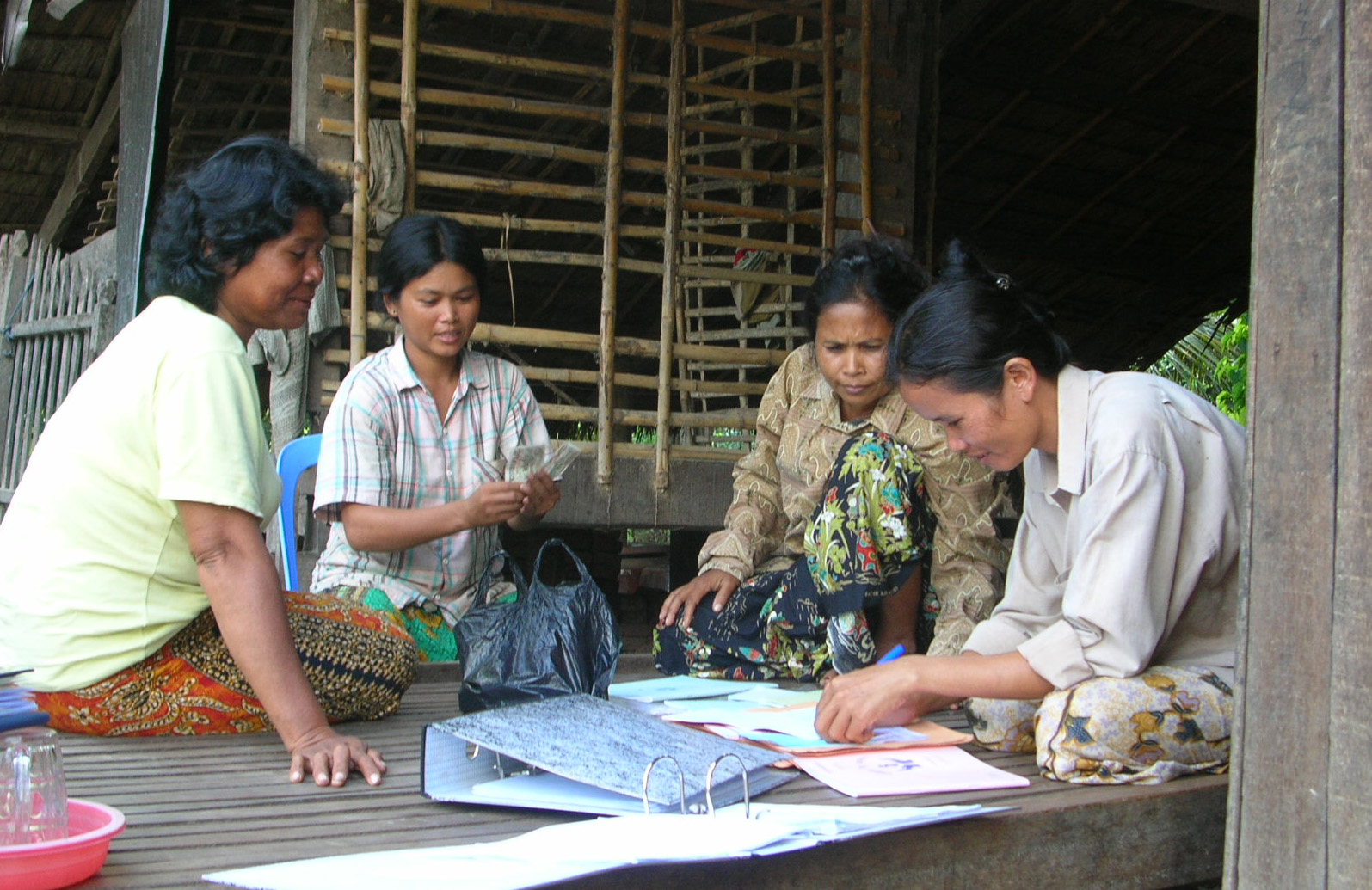 Community-based savings bank in Cambodia © Brett Matthews via Wikimedia
Community-based savings bank in Cambodia © Brett Matthews via Wikimedia
There is a wealth and an increasing interest in learning from the experiences of other countries, learning from the economic histories and trajectories of other countries and in trying to put those together now in a way that is more universal and cooperative, rather than in a way that is extractive and that characterized much of the international economic relations of the late 20th century.
Defining the West
As geographers, we are always inherently interested and perhaps naturally inclined to be skeptical towards geographical simplifications, metaphors that tell us that, for example, geography is destiny, or claims that geographical designations somehow translate into political or cultural designations. Very often when people speak of the West, they are speaking of a very particular idea, about a set of countries, a set of norms, a set of institutions and also, though they may not realize it, a set of privileges that in actual fact do not constitute any geographical claim to coherence. Do we mean Western Europe? Do we mean North America? Do we mean Japan? Do we mean the Antipodes? In different ways, different countries might consider themselves to be part of the West or its Western inheritance, intellectually, politically, but in all of those cases, what the West is is no more than what people imagine and want it to be.
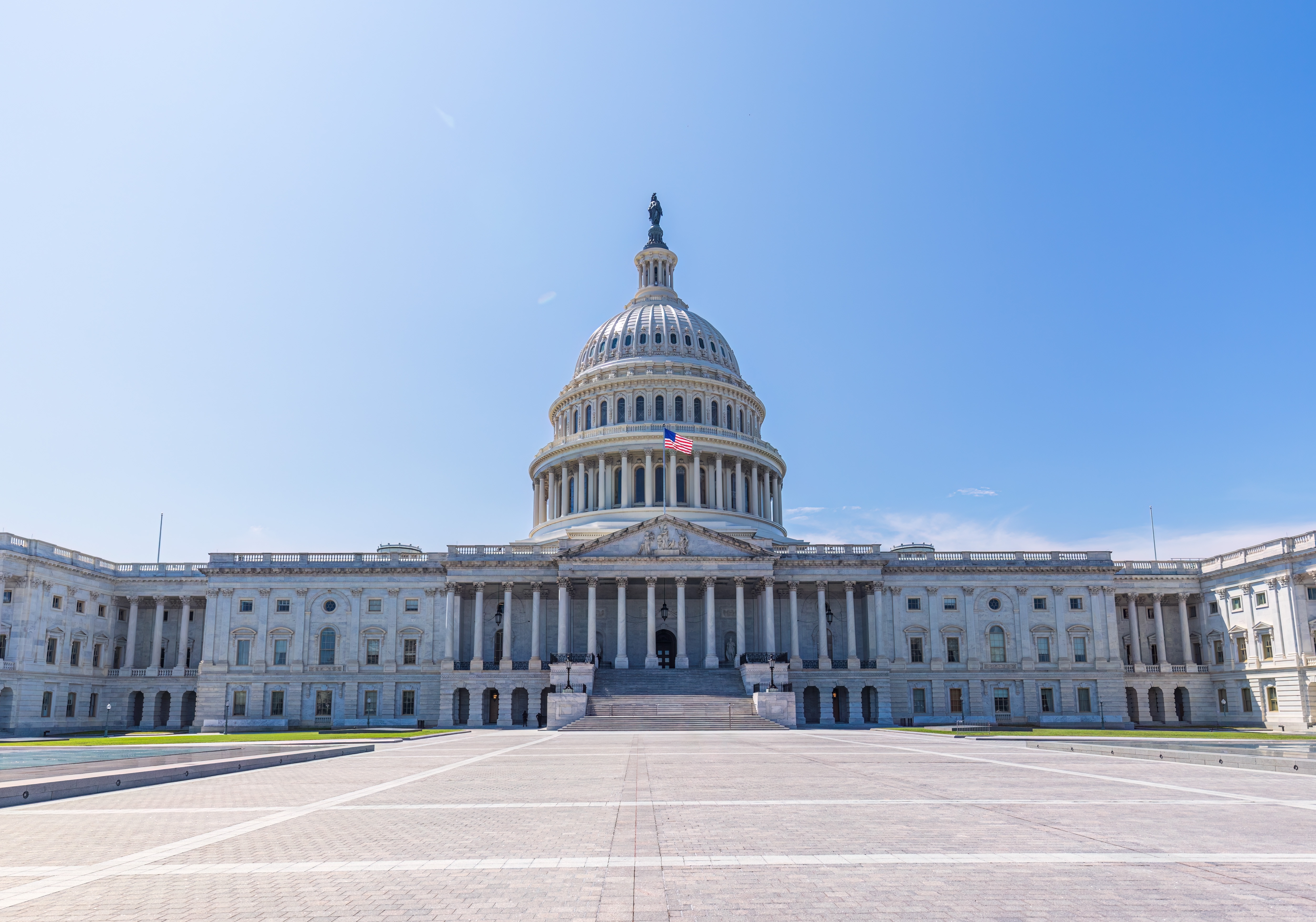 The United States Capitol © Shutterstock
The United States Capitol © Shutterstock
Very often as geographers, we would say that the West is an imaginative construct, and like all imaginative constructs, it is used to particular effects. Those that are willing and able to use the West as a claim will do so, and those that understand it as an imposition will also use the West in that way. Like any political concept, the West — the idea of the West — is fundamentally contested, and we need to recognize this whenever we are engaging in conversations about what particular countries, regions or territories mean to us, and mean in terms of the history of the world.
Democracy's fragility
If there was one misconception about democracy that I would challenge, it is the idea that democracy, perhaps even more specifically liberal democracy, is something that is always able to muddle through — that we have democracy, that we have somehow earned it, that we have the capacity to use it, its freedoms, to ensure that we respond to the challenges of the day. I certainly hope that may be the case, but I would not want to rely on the fact that that is the case.
 © Ground Picture via Shutterstock
© Ground Picture via Shutterstock
Democracy is ultimately no more and no less than what we make it to be: the institutions we create to nurture and protect it, the capacity of individuals to live up to the demands of those institutions and of the rules and regulatory framework that we establish around democracy. That, for me, is where the core of democracy emerges from, and that, for me, needs to be understood as something fundamentally fragile, as something that needs protecting, and as something that will change from era to era. The idea that democracy itself necessarily and always will continue and survive and thrive is an assumption that we in the current age in particular would do well to rid ourselves of.
Editor’s note: This article has been faithfully transcribed from the original interview filmed with the author, and carefully edited and proofread. Edit date: 2025
Discover more about
democracy
Reid-Henry, S. (2019). Empire of Democracy: The remaking of the West since the Cold War, 1971–2017. John Murray.
Reid-Henry, S. (2015). The political origins of inequality: Why a more equal world is better for us all. University of Chicago Press.
Reid-Henry, S. (2020). Inequality and democracy: A response to the International Panel on Social Progress (IPSP) Report 2018. Review of Social Economy, 78(2), 185–202.
Reid-Henry, S. (2011). Spaces of security and development: An alternative mapping of the security–development nexus. Security Dialogue, 42(1), 97–104.
De Tocqueville, A. (1835). Democracy in America. Saunders and Otley.